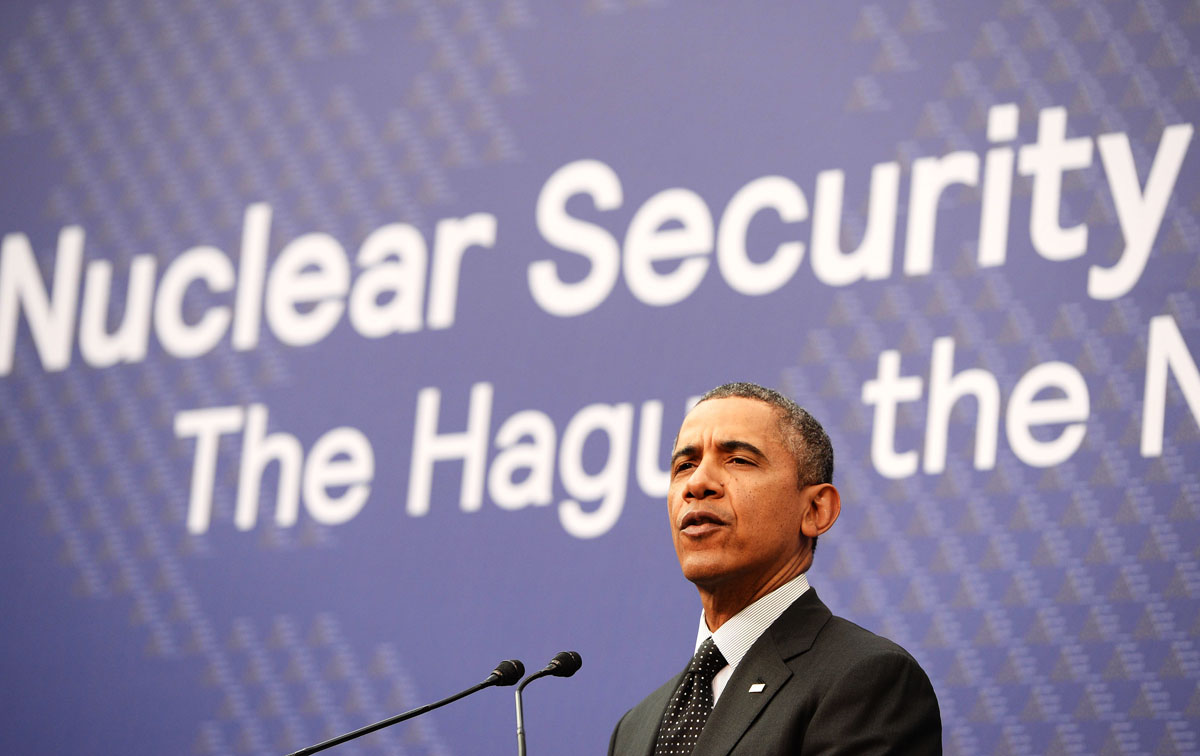
Wrapping up the third biennial Nuclear Security Summit (NSS), which gathered together 53 countries, Obama urged world leaders to work closer together to stop nuclear terrorism that he dubbed "the most immediate and extreme threat to global security".
"It is important for us not to relax but rather accelerate our efforts over the next two years, sustain momentum so that we finish strong in 2016", said the US leader, when he will host a return meeting.
"Given the catastrophic consequences of even a single attack, we cannot afford to be complacent," he stressed.
Dutch Prime Minister Mark Rutte, hosting the talks, said that "major steps" had been taken in terms of the three main goals of the summit: reducing the amount of dangerous nuclear material; improving the security around this material and bolstering international cooperation on the nuclear issue.
And in a joint statement unveiled with much fanfare on the sidelines of the NSS, 35 of the 53 countries pledged to work closer together and submit to "peer reviews periodically" of their sensitive nuclear security regimes.
The nations - including Israel, Kazakhstan, Morocco and Turkey but not Russia - vowed to "realise or exceed" the standards set out in a series of guidelines laid down by the International Atomic Energy Agency (IAEA) to safeguard nuclear materials.
These are the "closest things we have to international standards for nuclear security", US Energy Secretary Ernest Moniz told reporters as he presented the pledge.
But experts cautioned that the deal lacked teeth without the agreement of other powers with large nuclear stockpiles.
"The absence of Russia, China, Pakistan and India - all nuclear weapons states with large amounts of nuclear material - as well as others, weakens the initiative's impact," said the Fissile Materials Working Group, a collection of more than 70 experts on the nuclear issue.
Miles Pomper, an expert at the California-based James Martin Center for Non-proliferation Studies, said the statement was "the most important accomplishment of the summit".
But he added: "We need to get the rest of the summit members to sign up to it, especially Russia, and we need to find a way to make this into permanent international law."
According to the final statement, leaders will push to reduce stockpiles of highly enriched uranium, which can be used to make an atomic bomb, and convert it to safer lower enriched uranium.
Obama said leaders should consider transforming the current summit format to a more permanent body run by ministers and officials in order to "synch up the NSS with existing institutions like the IAEA, interpol."
The summit was overshadowed by the crisis in Ukraine, with Obama gathering his G7 allies on Monday to effectively expel Russia from the top table by scrapping a G8 meeting planned in the Russian resort of Sochi in June.
UN Secretary General Ban Ki-moon has warned that the West's failure to defend Ukraine from Russian aggression should not be seen as an invitation to other states to acquire nuclear weapons.
Ukraine gave up its huge Soviet-era nuclear arsenal in exchange for guarantees from the West and Russia that its sovereignty would be safeguarded.
These assurances have been "seriously undermined", said Ban. "This should not serve as an excuse to pursue nuclear weapons, which will only increase insecurity and isolation."
German Chancellor Angela Merkel told reporters that Russia's actions were "definitely a very bad example internationally."
But Obama said he was glad that Kiev had given up its nuclear weapons because otherwise "the difficult situation we are dealing with in Ukraine now would be even more dangerous."
The first NSS was held in Washington in 2010, with a follow-up summit in Seoul before this year's event in The Hague.
The United States will again host the final summit in 2016.
COMMENTS (2)
Comments are moderated and generally will be posted if they are on-topic and not abusive.
For more information, please see our Comments FAQ










1732354127-0/Untitled-design-(3)1732354127-0-270x192.webp)






Nuclear security summit is an international forum where most of the members of international system joins in to strengthen the mechanisms of nuclear safety and security to counter the emerging global threat of nuclear terrorism. As nuclear terrorism is a gloal threat then it is very much mandatory for all the states to cooperate with each other so that real meaning of the summit can be understandable also to achieve the goal of combating nuclear terrorism activities. This is the need of the hour for all the states to step into the summit and to make the international safety and security norms stringent and applicable.
The NSS 2014 ended up with heartiest pledges and vows to dissolve amongst disputes to counter this global predicament of nuclear security at all levels. Time will reveal that how much states adhered with this notion for nuclear security. History is full of very likely accords, MoUs and treaties to counter proliferation and arms control. The level of success and achievement is questionable till so far. States give highest priority to national interests nor the global issues and maintained dual standard policies. This is the very reason that we have not achieved commendable success regarding nuclear pragmatically. Hopes are high after NSS as nuclear mishaps are not in the interest of any one in this globe.